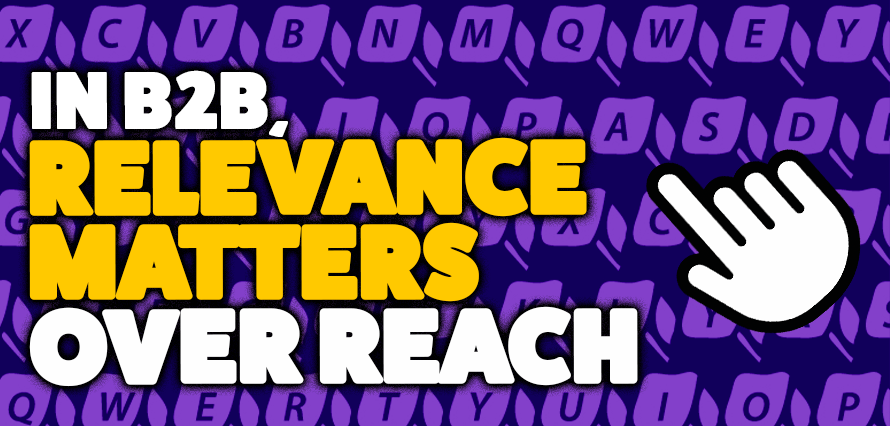February 10, 2025

78% of B2B buyers purchase based on influencer trust
Influencer marketing in B2B has evolved. It’s now a necessity for brands looking to build trust (and bear in mind, 52% of buyers value trust over popularityMarTech), drive engagement, and generate leads.
But many marketers are still hesitant, grappling with challenges like proving ROI, identifying the right influencers, and integrating campaigns into their broader strategies. Here’s how you can make it work and why ignoring it might leave your brand behind.
Why suddenly do B2B influencer matter
B2B buyers have changed. Decision-makers no longer rely on brand-led messaging, they expect insights from trusted peers and industry experts. In fact, 89% of B2B buyers trust peer recommendations over corporate marketing (Edelman). Traditional sales pitches no longer cut through, and marketers are turning to influencer strategies that prioritise authenticity and humanised content.
At the same time, AI is reshaping how brands engage with influencers. Automation is making it easier to discover, manage, and measure influencer impact, but with this speed comes a challenge: how do you maintain trust when AI-generated content risks diluting authenticity? Balancing efficiency with credibility is now a critical priority.
The decline of traditional B2B media has only accelerated this shift. Once the backbone of industry marketing, trade media is losing relevance, with 49% of marketers now prioritising influencer-led content to build trust (MarTech). Buyers aren’t waiting for gated reports or press releases; they are turning to real-time insights from people they already follow and respect.
With 75% of B2B marketers already using influencers to drive engagement (MarTech), the question isn’t whether brands should invest in influencer marketing—it’s whether they can afford not to.
What Makes a Great B2B Influencer?
B2B influencers are not chasing likes, they’re driving decisions. They might be thought leaders, analysts, or even your employees. What defines their value is their credibility and the trust they command within niche audiences.
When looking at B2B influencers, you need to identify those that have:
- Niche expertise and a deep knowledge in your industry or sector. Think tech consultants or procurement leaders
- Engaging, insightful, and quality content aligned with your brand values
- Influencers should connect with decision-makers, aligning with your audience, not just wide audiences.
For example, Fujitsu uses both external tech evangelists and internal subject-matter experts on LinkedIn to explain complex AI topics, boosting credibility and engagement.
Selecting the right B2B influencers is critical. Unlike B2C, where reach often takes precedence, B2B success depends on relevance, trust, and expertise. Use this framework to evaluate potential influencers:
| Criteria | What to Look For | Why It Matters |
| Niche expertise | Influencer’s depth of knowledge in your industry or topic area | Decision-makers value influencers who genuinely understand their challenges |
| Content quality | Originality, creativity, and consistency in delivering value-driven content | High-quality content engages audiences and builds trust |
| Audience alignment | Overlap between influencer’s followers and your target customers | Engaging the right audience ensures higher ROI |
| Engagement rates | Likes, shares, comments relative to follower count | Authentic engagement matters more than vanity metrics |
| Past collaborations | Previous work with brands in your industry | Shows credibility and relevance in similar campaigns |
| Audience authenticity | No fake accounts or bots among followers | Ensures campaign credibility |
| Social proof | Industry recognition, awards, and visible thought leadership | Highlights the influencer’s authority |
| Platform relevance | Active presence on platforms where your audience engages most | Ensures your message reaches the right channels |
Why Measurement Matters in B2B Influencer Marketing
Measurement is where most B2B influencer campaigns fall apart. Too many brands focus on vanity metrics (likes, impressions, follower counts), without connecting influence to actual business impact.
B2B buying cycles are long, and influence works across multiple touchpoints. That means tracking performance isn’t about a single metric—it’s about mapping influencer impact across awareness, engagement, and, ultimately, revenue.
Brands that get this right see measurable results: 78% of B2B marketers say influencer marketing is effective, even in small-scale campaigns (The Social Media Hat).
How to Measure ROI in B2B Influencer Campaigns
To prove influencer marketing works, you need the right framework. Here’s how to break it down:
| Objective | Metric | Tools |
| Brand Awareness | Impressions, share of voice | Social listening tools |
| Engagement | Comments, shares, click-throughs | Native platform analytics |
| Lead Generation | Leads, conversion rates | Google Analytics, HubSpot |
| Sales Impact | Deal size, time to close | CRM, multi-touch attribution |
| Content Performance | Format effectiveness | Content scoring tools |
Align your measurement to business goals. If you’re running an awareness campaign, focus on engagement and brand sentiment. If sales impact is the priority, track how influencers contribute to lead generation and revenue.
One of the biggest mistakes? Not using unique tracking links or promo codes. Without these, attributing influencer-driven traffic is near impossible. Use multi-touch attribution models to see where influencers play a role in decision-making, from initial brand discovery to final conversion.
Get started now
B2B influencer marketing isn’t an experiment anymore. And yet, many brands still treat it like an afterthought, failing to measure real impact or choosing influencers based on vanity metrics rather than relevance.
If your marketing strategy still revolves around brand-led messaging and traditional trade media, you’re already behind. Decision-makers are choosing influence over ads, trust over reach, and expertise over fluff.
There’s a good blog on B2B influencers 101, that is worth a read
And the numbers back it up. B2B buyers are 2.5x more likely to buy from a brand recommended by an industry influencer.
The focus for 2025 is relevance over reach!